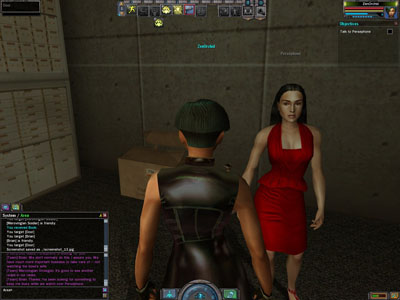In practice, it all goes down fairly fast, and, if you're paying attention, combat can look and sound quite cool. The Matrix's visual flair isn't lost here at all. The problem is that most of the time, you'll likely find yourself focused on the information coming from the combat interface instead of the cool stuff your character is doing. Also, visual hiccups happen frequently enough to legitimately detract from the experience -- stuff like enemies prematurely falling to the ground, leaving your avatar shadowboxing for thirty seconds at a time. Veteran MMO players are likely accustomed to these kinds of kinks, which are characteristic of recently released games, but for a virgin to the genre, it might seem more than a bit unsettling.
In any case, you'll likely be jealous of the cool stuff that the more combat-oriented characters can do, if you're focusing on the Hacker or Coder paths. Much like in other MMOs, if you're not an active combatant, you'll be out of the spotlight, which, for a game that rides so heavily on the visual dynamism of its combat, is a tad disappointing. For what it's worth, characters who settle into these roles will know what exactly they're getting into well in advance, given how the game's progression works. It's just a shame that a similarly engrossing system wasn't worked in for them.

If you're a mover and shaker in the world, expect to meet with some familiar faces.
Though it appears that most of the effort has gone into designing the game's combat system, MxO is actually being touted as a story heavy game. The live event will need to factor heavily into this, because frankly, the game's mission system isn't cutting it at this point. In terms of giving players regular and decently-rewarding content on demand, it succeeds: you can call up any of your character's contacts on your cell phone at a whim, and get a task assigned to you. These normally involve traveling through the city for a few minutes, entering a building, fighting some enemies, and then exiting the building.
The experience rewards you get for completing these missions far exceed what you would get from "grinding" on the field, so there's a clear incentive for doing them. But the narrative elements are little disappointing. The characters that you encounter in the missions will communicate to you via blocks of text in a tiny window, and it's too easy to accidentally close one a second after it pops up. Occasionally, however, you'll meet one of the series' important characters -- such as Niobe, or Persephone, depending on your faction -- and in these cases, you'll be treated to recorded dialogue. But for the most part, it's easy to lose sight of the narrative particulars of your task, and simply focus on the experience and monetary rewards.





